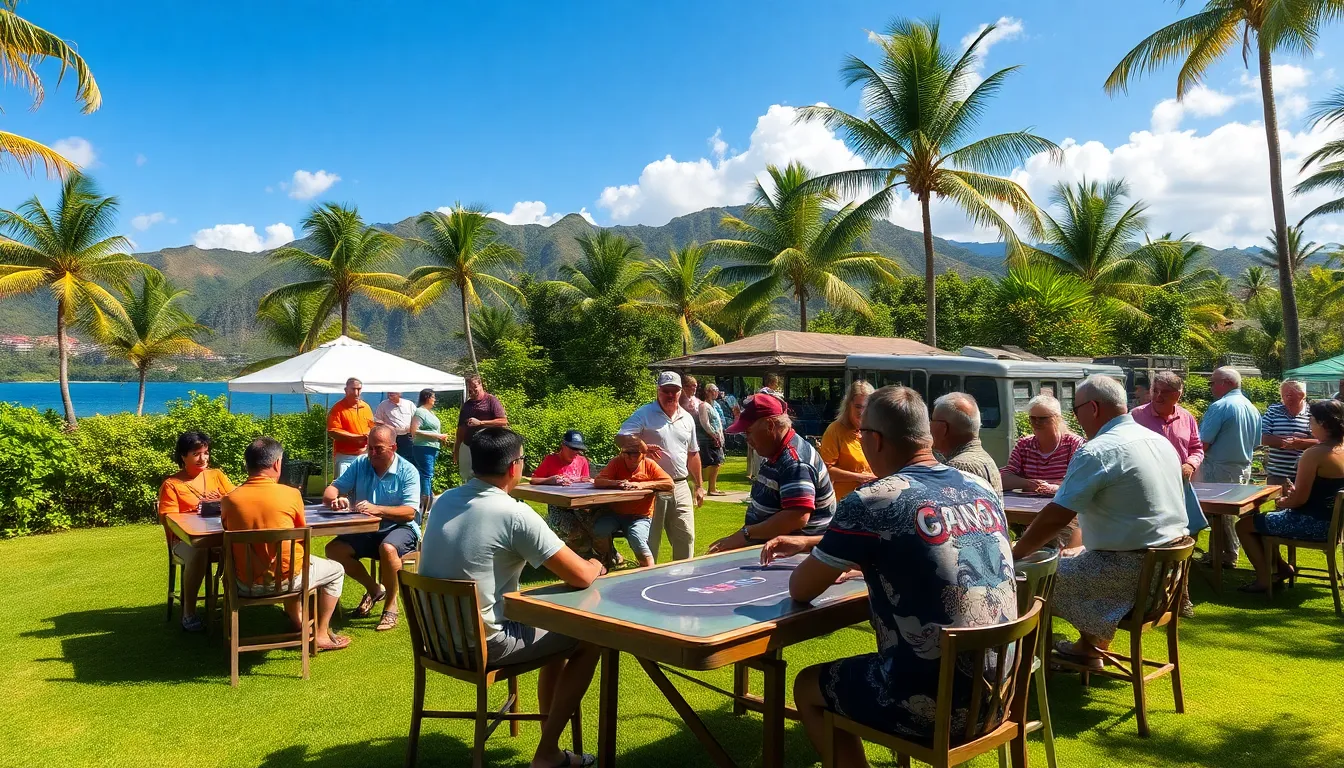Imagine lounging on a sun-kissed beach in Hawaii, sipping a piña colada, and pondering the age-old question: are there casinos in paradise? While the islands are famous for their stunning landscapes and vibrant culture, the answer might surprise you. Hawaii’s unique laws and rich traditions have kept the slot machines and poker tables at bay, leaving many to wonder if they’ll ever get a taste of that thrilling casino life amidst the palm trees.
But don’t hang up your flip-flops just yet! The absence of traditional casinos doesn’t mean you can’t find ways to enjoy a little friendly gambling. From local gaming events to online options, there’s still a chance to roll the dice—even if it’s not on the sandy shores. So, let’s dive into the intriguing world of gambling in Hawaii and discover what makes this tropical paradise both a dream destination and a curious case for casino enthusiasts.
Table of Contents
ToggleOverview of Gambling in Hawaii
Gambling in Hawaii faces strict regulations, reflecting the state’s cultural values and legal framework. Traditional casinos are absent, which makes it unique compared to other states. Residents and tourists can explore alternatives like bingo nights and charity poker events, offering limited gaming experiences.
Local communities host various gaming events, bringing together residents for social entertainment. These events often take place in community centers or local halls, supporting charitable causes while providing a fun atmosphere. Visitors may find more relaxed options like Hawaiian luaus, which sometimes incorporate games.
While online gambling remains illegal in Hawaii, residents can access international sites. However, this approach comes with risk, as legal consequences could arise from participation in unauthorized online gaming. Enthusiasts often seek responsible ways to enjoy gaming without violating state laws.
Native Hawaiian gaming is subject to federal regulations, with ongoing discussions about introducing regulated games on tribal lands. Current federal law restricts any casino-style operations unless they fall under specific arrangements. Therefore, the potential for future developments in casino-style gaming exists, but remains uncertain.
Gambling enthusiasts should understand Hawaii’s landscape and its restrictions. Exploring local events may satisfy curiosity without engaging in prohibited activities. By focusing on community gatherings and legal avenues, residents and visitors can enjoy a taste of gaming culture in this tropical paradise.
Legal Status of Casinos in Hawaii

Hawaii’s laws around casinos reflect both strict regulations and cultural perspectives on gambling. The state maintains some of the toughest gambling laws in the United States, which prohibits traditional casinos.
State Laws and Regulations
Hawaii’s Revised Statutes explicitly forbid gambling, including casino operations. Legislative discussions regarding casino legalization periodically arise but have not succeeded. Any form of gambling besides limited poker and bingo events remains illegal. Residents rely on activities organized at community centers, often as fundraising efforts. In addition, discussions regarding legalized gaming on tribal lands continue, but federal regulations impede immediate changes.
Comparison with Other States
Unlike many states that embrace gambling, Hawaii remains a notable exception. States such as Nevada and New Jersey thrive with extensive casino options, driving significant tourism revenue. Furthermore, states adjacent to Hawaii, like California, offer various gambling forms, including racetracks and tribal casinos. This contrast highlights Hawaii’s unique stance, where traditional gambling opportunities are fundamentally absent. Visitors often seek alternative experiences, such as local gaming events, which lack the scale of mainland casinos.
Current Gambling Options in Hawaii
Hawaii’s gambling scene includes limited options due to strict regulations. Traditional casinos aren’t an option, yet alternative activities exist.
Native American Influence
Native American tribes contribute to discussions about potential gambling legalization in Hawaii. Tribes argue for rights to establish gaming operations, yet federal regulations complicate these efforts. There’s significant interest but progress remains slow. Ongoing negotiations between state officials and tribal representatives focus on possible future developments. The potential for tribally operated casinos could reshape Hawaii’s gambling landscape.
Alternative Gambling Activities
Local communities organize numerous alternative gambling activities across Hawaii. Residents participate in bingo nights, frequently held in community centers, serving both entertainment and fundraising purposes. Charity poker events attract those seeking a casual gambling experience. Moreover, social clubs often host tournaments, where members can enjoy gaming without violating state laws. For those interested in online gambling, accessing international sites is an option, albeit with legal risk. Despite restrictions, Hawaii’s residents find unique ways to engage in gambling culture.
Economic Impact of Casinos in Hawaii
Hawaii’s lack of traditional casinos affects its economic landscape. Potential benefits of legalizing casinos include increased tourism revenue and job creation. Visitors often seek entertainment options, and casinos could attract a broader audience to the islands. Increased tax revenues could support local infrastructure and social programs.
Possible drawbacks of casinos center around social issues. Concerns arise regarding gambling addiction and its impact on the community. Lawmakers and residents may also worry about the preservation of Hawaiian culture and values. Legalized gaming could lead to environmental effects such as land development and strain on local resources. Balancing economic benefits with community well-being remains crucial in discussions about casinos in Hawaii.
Public Opinion on Casinos in Hawaii
Public opinion regarding casinos in Hawaii reveals a complex landscape. Many residents appreciate the state’s strong cultural values, favoring a prohibition on traditional casino establishments. Preservation of Hawaiian culture remains a significant concern, as some individuals believe that casinos could compromise local traditions and community integrity.
Numerous surveys indicate that while some support the idea of introducing casinos as a means to boost tourism, others remain steadfast in their opposition. Concerns about gambling addiction often arise in discussions, leading to a stalemate in public sentiment. Economic arguments often highlight the potential for increased tourism revenue and job creation associated with casino operations.
Local community gatherings frequently provide alternatives for residents desiring gaming experiences. Bingo nights and charity poker events enjoy popularity, showcasing a preference for grassroots activities. Those who engage in these activities maintain a sense of tradition while still enjoying social interaction and entertainment.
Long-standing negotiations between state officials and Native American tribes continue, revealing a desire for establishing gaming operations under specific guidelines. Many recognize that bringing casinos to Hawaii could reshape the gambling landscape. The ongoing dialogue reflects a community grappling with the balance between economic opportunities and cultural preservation.
Varying opinions exist among stakeholders, emphasizing the need for comprehensive discussions. Community involvement in shaping the future of gambling in Hawaii is vital for ensuring that any developments align with local values and interests. Ultimately, the conversation about casinos is ongoing and reflects the diverse perspectives held by Hawaii’s residents.
Hawaii’s unique cultural values and strict laws create a distinct gambling landscape unlike any other in the United States. While traditional casinos are absent, residents and visitors can still find enjoyment through community events and online gaming opportunities. The ongoing discussions about potential gaming operations on tribal lands indicate a willingness to explore new avenues while respecting local traditions.
As Hawaii navigates its relationship with gambling, the focus remains on balancing economic benefits with the preservation of its rich cultural heritage. For those seeking a taste of gaming in this tropical paradise, engaging in local activities offers a fulfilling alternative that aligns with the state’s values.





